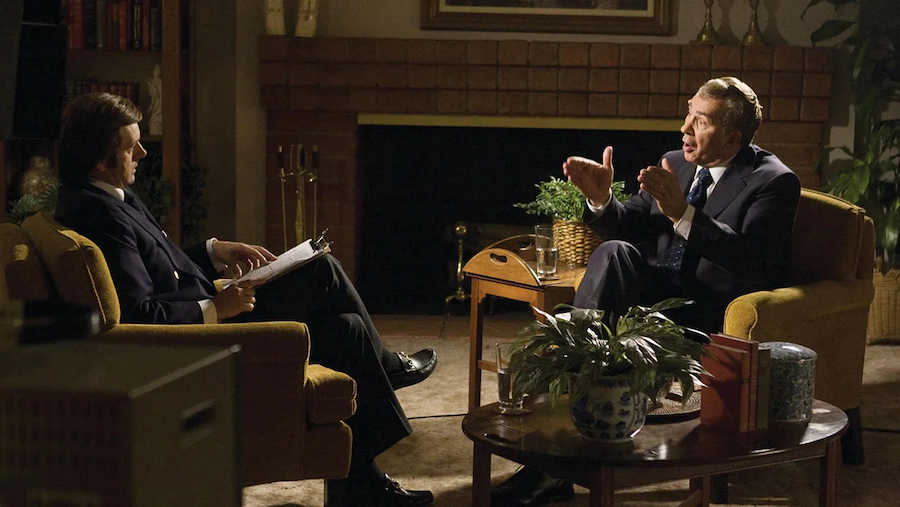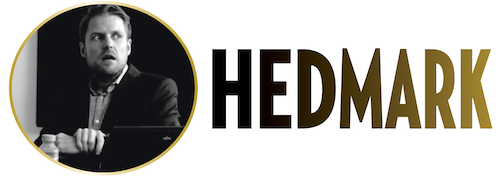
400 MILLION PEOPLE WERE WAITING FOR THE TRUTH.

Ladies and gentleman, welcome to a bout not easily forgotten. In one corner we have David Frost, a TV presenter looking to enter the limelight and possibly make a lot of money. In the other corner we have Richard Nixon, a former U.S. president looking to step back into the limelight and possibly make a lot of money. Neither they nor their teams will play softball – no holds barred is the agreement between them. Cheap shots? Oh, there will be a few.
Getting into the U.S. market
In 1977, British TV personality David Frost (Michael Sheen) is enjoying some popularity with his lightweight programs. For a while now though, David has been thinking seriously about the chances to book Richard Nixon (Frank Langella) for an interview, one he could sell to American networks and thereby find a way into the lucrative U.S. market. The disgraced former president has retired to a California beach villa and isn’t interested in any interviews. But he would like an opportunity to explain what really happened during the Watergate scandal and possibly find a way back to being a revered statesman in the eyes of the American people. When David offers him a substantial sum of money for a series of interviews, Nixon accepts, thinking that the frothy TV presenter will be easily controlled.
A landmark moment for journalism
These interviews, where President Nixon revealed his opinion that the president is above the law and also was close to admitting culpability in Watergate, is depicted as a landmark moment for journalism. That’s debatable, but writer Peter Morgan found a fascinating story behind the interviews, in the circumstances for both men leading up to their confrontation and also in their characters and the similarities they shared (which is particularly evident in a gripping, fictional phone conversation between them).
When Ron Howard turned the play into a movie he was careful not to screw things up, insisting on keeping Michael Sheen and Frank Langella in the leads
Morgan choreographed the interviews to make them look almost like rounds in a boxing fight, with their participants’ crews functioning as trainers and cutman. When Ron Howard turned the play into a movie he was careful not to screw things up, insisting on keeping Sheen and Langella in the leads. The film begins and ends like a documentary, infusing Langella into real news images, and setting up fake interviews with some of those who were in the room during the Frost/Nixon meetings. There isn’t much to complain about here regarding the authentic-looking, contemporary period details; we truly feel like we’re part of this.
Sheen, who did Tony Blair so convincingly in another Morgan-scripted film, The Queen (2006), perfectly captures Frost’s leisurely, playful style, and Langella is spellbinding as the arrogant, childish, intelligent but morally challenged former leader. Frost and Nixon are careful not to reveal their desperate, inner struggles but the actors know how to convey them in a heartfelt manner; the stage gave them plenty of time to practice.
It’s a thrilling piece of cinema about psychology and journalism, but also the power of television. The interviews had millions of people glued to TV sets, witnessing a president once again underestimating the effect of that medium, just like he had done in 1960.
Frost/Nixon 2008-U.S.-U.K.-France. 122 min. Color. Widescreen. Directed by Ron Howard. Screenplay, Play: Peter Morgan. Editing: Mike Hill, Daniel P. Hanley. Cast: Frank Langella (Richard Nixon), Michael Sheen (David Frost), Kevin Bacon (Jack Brennan), Rebecca Hall, Toby Jones, Matthew Macfadyen, Oliver Platt, Sam Rockwell.
Trivia: Co-produced by Ron Howard. Martin Scorsese, Mike Nichols, George Clooney and Sam Mendes were reportedly considered for directing duties; Warren Beatty turned down the offer to play Nixon.
Quote: “No matter how many awards or column inches are written about you, or how high the elected office is, it’s still not enough. We still feel like the little man. The loser. They told us we were a hundred times, the smart asses in college, the high ups. The well-born. The people who’s respect we really wanted. Really craved. And isn’t that why we work so hard now, why we fight for every inch? Scrambling our way up in undignified fashion. If we’re honest for a minute, if we reflect privately, just for a moment, if we allow ourselves a glimpse into that shadowy place we call our soul, isn’t that why we’re here? Now? The two of us. Looking for a way back into the sun. Into the limelight. Back onto the winner’s podium. Because we can feel it slipping away. We were headed, both of us, for the dirt. The place the snobs always told us that we’d end up. Face in the dust, humiliated all the more for having tried. So pitifully hard. Well, to hell with that! We’re not going to let that happen, either of us. We’re going to show those bums, we’re going to make ’em choke on our continued success. Our continued headlines! Our continued awards! And power! And glory! We are gonna make those mother fuckers choke!” (Langella to Sheen)
Last word: “When I saw the play I started feeling like I was reliving the journey of watching these interviews, I was one of those people being like, ‘Were we too tough on [Nixon]? Was this just political expediency so he would step down? What really happened?’ I was trying to find a way to forgive him. And when the night of the Watergate interviews finally came around, in moments like that I could see it on his face that he had committed a crime, it was abuse of power, he had known about it. It was very cathartic for me, and he need to leave office, of course. It closed a chapter for me.” (Howard, Vanity Fair)
